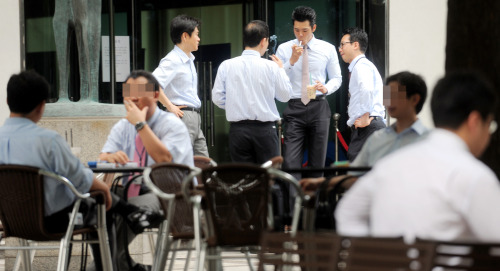Today, South Korea is no longer a smokers’ haven. The social environment of smoking has changed so much over the years, and smokers like Choi too often find themselves unwelcome almost everywhere in the country.
Such changes have come rather slowly as if those enforcing them were careful enough not to alert those who might oppose them, namely, smokers.
“I’ve really had no problem with any new laws or regulations on smoking, but it feels like they have changed it bit by bit and now they add up so much,” Choi said in an interview.

Choi complains that he can’t even smoke from the window of his own apartment anymore because his neighbors next door or upstairs will complain about smoke coming in through their windows.
“I do understand people who do not smoke do not like to be around people who do, but that does not mean those who smoke must suffer,” he fumed. “Smoking certainly is not a crime.”
South Korea’s smoking rate for people aged 19 or older stood at 39.6 percent last year, down from 43.1 percent a year earlier but still way above the average of the Organization for Economic Cooperation and Development member nations, which recorded 27.3 percent in 2008.
South Korea hopes to bring its smoking rate down to the OECD level within the coming years.
Smokers in big cities like the capital Seoul face more difficulty in finding places to enjoy smoking.
Under its latest ordinance set to go into effect on March 1, the Seoul city government has designated 23 new public parks and 295 bus stops where smoking will be banned.
If you are caught smoking in the designated areas, you will be fined 100,000 won ($89), instead of a 30,000-won fine usually imposed on other smoking violations.
Smoking could become more expensive, too. Health Minister Chin Soo-hee recently suggested that cigarette prices must be doubled to 5,000 won ($4.60) a pack as part of efforts to discourage smoking.
She later backed down under angry reactions from smokers but insisted that she will find an appropriate price after consulting with the U.N. World Health Organization.
Smokers blame the government for first getting them hooked on smoking and now trying to tax them even more.
“If smoking is so bad and harmful, they should have just made it illegal a long time ago, especially when they are very aware how addictive smoking is,” said a manager of Freezon, an online community for smokers, previously called “ilovesmoking.”
“About half of the price of a cigarette is already tax and they want to impose more tax, claiming it will cut the smoking rate. The truth is it will have little effect on the smoking rate because people who smoke will continue to buy even at high prices, meaning they will only end up paying more tax.”
In addition, smokers in the country face added difficulties at the office, as many companies are advising, if not forcing, their workers to quit smoking or even choosing not to hire new employees who smoke.
Taihan Electric Wire Co., South Korea’s oldest and second-largest electric cable maker, recently launched a company-wide no-smoking campaign, offering a 350,000-won ($320) reward to anyone who agrees to quit, in addition to a free three-day vacation to anyone who succeeds in quitting.
Some companies are even more intent on having their employees quit smoking.
Hanwha Chemical Corp. recently launched a similar anti-smoking campaign that includes regular nicotine tests for workers who pledge to quit smoking. If an employee fails to show significant drops in nicotine levels, twice in a row, he or she must spend three days at a rehabilitation center at his or her own expense and vacation time.
“The no-smoking campaign not only promotes the health of workers but also helps create a better and cleaner environment for all employees, including those who smoke,” said Lee Jae-won, a public relations official of Kumho Asiana Group, which owns Asiana Airlines and Kumho Tire.
The group is a pioneer in corporate anti-smoking campaigns in South Korea. It began its no-smoking campaign in 1991 when South Korea did not even have its own regulations in place against smoking inside office buildings.
Most smokers or people who have recently quit smoking, either by choice or force, agree such anti-smoking campaigns being waged by some big companies are for the good of all people, including themselves. (Yonhap News)
<관련 기사>
서울 주요 광장 3월부터 금연구역 지정
3월부터 서울광장 등 시내 주요 광장이 금연구역으로 운영된다.
서울시는 시민의 간접흡연 피해를 줄이고자 다음달 1일부터 서울광장ㆍ청계광장ㆍ광화문광장 전역을 금연구역으로 지정한다고 4일 밝혔다.
지난해 제정된 `서울시 간접흡연 피해방지조례'는 시민의 건강보호를 위해 시장이 도시공원, 학교정화구역, 버스정류소, 가스충전소 등을 금연구역으로 지정할 수 있도록 하고 있다.
서울시는 석달간의 시민 홍보기간을 거쳐 6월1일부터는 금연구역에서 담배를 피우다 적발되면 과태료 10만원을 부과할 방침이다.
서울시는 이에 따라 이달 중으로 광장의 경계 곳곳에 금연구역 표시와 조성 목적 등을 담은 표지판ㆍ안내판을 설치할 계획이다.
서울시는 아울러 올해 9월에 시내 공원 23곳, 12월에는 중앙차로 버스정류장 295곳 등 연내 모두 321곳으로 금연구역을 확대할 예정이다.
서울시는 이번 민선 5기에서 자립ㆍ보편ㆍ참여를 내세운 민선 4기 '서울형 그물망 복지'에 시민 건강관리 강화 등 예방적 복지를 더한 `서울형 그물망 지속가능 복지' 정책을 추진하고 있다.
자세한 사항은 서울시 복지건강건부 건강증진과(☎02-6321-4313)로 문의하면 된다.
서울시 관계자는 "건강한 도시 서울을 마련하기 위한 다양한 정책을 마련하도록하겠다"고 말했다. (연합뉴스)










![[Today’s K-pop] BTS pop-up event to come to Seoul](http://res.heraldm.com/phpwas/restmb_idxmake.php?idx=644&simg=/content/image/2024/04/17/20240417050734_0.jpg&u=)
![[Graphic News] More Koreans say they plan long-distance trips this year](http://res.heraldm.com/phpwas/restmb_idxmake.php?idx=644&simg=/content/image/2024/04/17/20240417050828_0.gif&u=)





![[KH Explains] Hyundai's full hybrid edge to pay off amid slow transition to pure EVs](http://res.heraldm.com/phpwas/restmb_idxmake.php?idx=652&simg=/content/image/2024/04/18/20240418050645_0.jpg&u=20240419100350)

